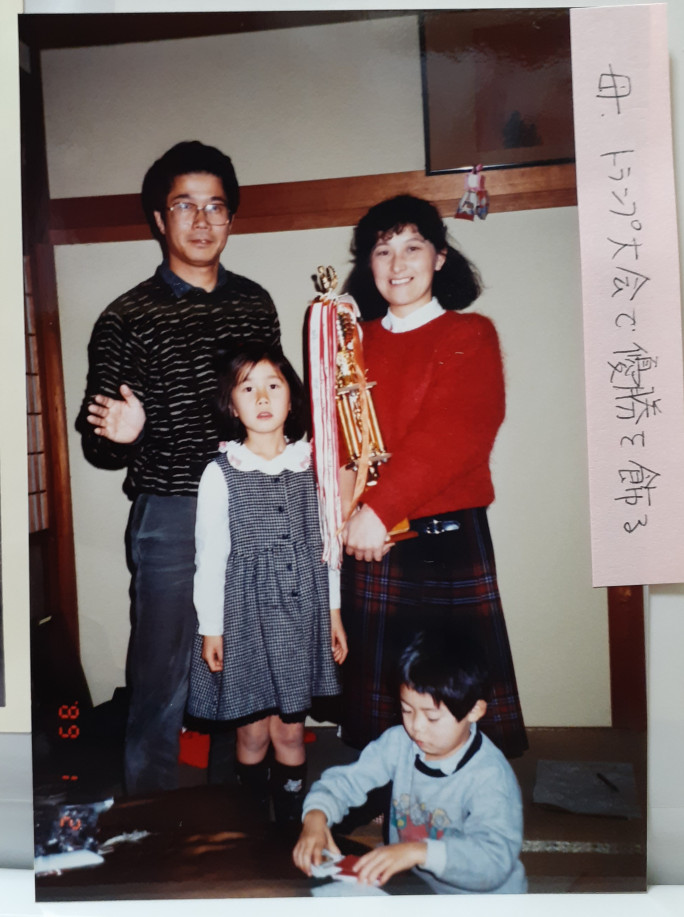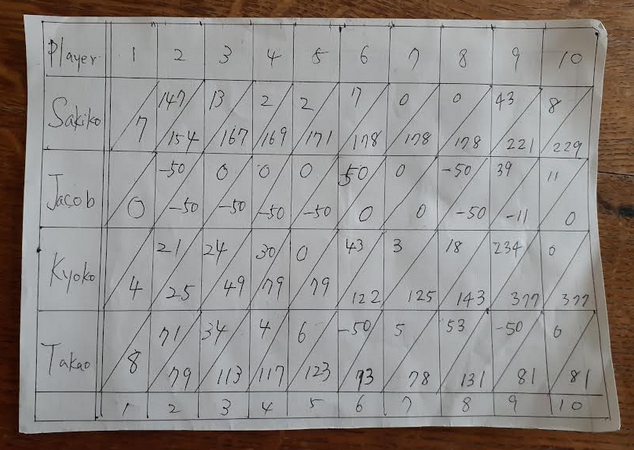Seven Bridge
A card game for 3 - 6 people (ideally 4)
The Mori family plays Seven Bridge on New Years or at any family gathering. They play competitively in a tournament format, with multiple games going at once, and then the winners of those games advance to the next round. There's a family trophy that gets handed around, and they also award prizes for the person who comes in second, and the person who came in second-to-last (known as the "Booby Maker"). Last place, or "Booby", gets nothing.
 This tradition has been going on long enough that seemingly every rule or unlikely event you could get into a fight about has already had its fight. In the interest of teaching this game to others, and in simply making a record, I sat down with Takao Mori and tried to write down every rule he could remember. If you need clarification on anything don't hesitate to write: jacob@fujichia.com. If I don't have an answer for you I'll ask Takao. It's also OK to just fight it out amongst yourselves.
This tradition has been going on long enough that seemingly every rule or unlikely event you could get into a fight about has already had its fight. In the interest of teaching this game to others, and in simply making a record, I sat down with Takao Mori and tried to write down every rule he could remember. If you need clarification on anything don't hesitate to write: jacob@fujichia.com. If I don't have an answer for you I'll ask Takao. It's also OK to just fight it out amongst yourselves.
I have decided to write only rules and not strategy, because it's fun to develop a strategy. :)
Big Picture
Seven Bridge is similar to mah-jongg and rummy in that you organize your cards into suited runs (8♣ 9♣ 10♣) and sets (3♣ 3♦ 3♥) and place them face-up in front of you on the table (into your "store").The goal is to have the lowest score at the end of the game. You get points by having cards left in your hand at the end of a round, or by putting down a round-winning card for someone else. It is also possible to lose points. The cards in your store do not affect the points in any way.
Things in your store can include runs or sets of at least 3 cards, any number of cards that build on or add to a run or set from someone else's store, or a 7, which is a special card that can be placed in a store alone, without anything else.
Play moves counter-clockwise.
A game consists of 10 rounds, although you can play less or more if you agree beforehand.

Game Play
Each player is dealt 7 cards.There is a pile of cards face down in the middle of the table, and a discard pile, which is face up.
A normal turn starts with picking up a card and ends with putting one in the discard pile. A round-winning turn may end without putting a card in the discard pile.
Generally you pick up from the face down cards but if someone discards a card that you can use immediately to form a set, you say "PON" and move the card to your store, then put down the cards required to make it a set. You may say this out of turn order but only between turns (between someone discarding and someone picking up a card).
If the player to your left discards a card that you can use to form a run, you say "CHI" and move the card to your store, then put down the cards required to make it a run. You can only Chi from someone to your left, unless your Chi is also Ron (see below).
After Pon of Chi, play proceeds in order, counter-clockwise from the person who called it. It's possible that a player's turn will be skipped.
Stores
You may add on to the cards in other people's stores but you must open a store first.To open a store you have to put down a set, a run, or a 7. You can't open a store by adding to someone else's store, but you can open a store and add to someone else's store in the same round.
If someone has put down a 7 (and your own store is open) you may add to the 7 as if it were a run, with a 6 or 8 of the same suit.
You can't recombine items in your or anyone else's store. Like if there's 6♠ 6♥ 6♦, 7♠ 7♥ 7♦, and 8♠ 8♥ 8♦, you can't rearrange them to form 6♠ 7♠ 8♠, 6♥ 7♥ 8♥, 6♦ 7♦ 8♦, just so you can put down your 9♦.
The items in your store have no effect on the points at the end of the round.
If you have items in your hand that you could put in a store, you are under no obligation to do so immediately. You can put down as much as you're able to during your turn, but you don't have to. You can hold playable cards in your hand for as long as you want.
Ending A Round
A round ends when someone gets rid of all the cards in their hand.If picking up the face up card (Pon or Chi) allows you to get rid of all the cards in your hand (to go out), you call "RON". As with Pon or Chi, you can call Ron after anyone's turn, it can be out of order from the expected play.
If your Ron is Chi, you can pick up from anyone. As Ron, you are not bound by the Chi requirement to pick up from the person on your left.
NICO NICO is a special type of Ron that consists of 4 pairs. You can call Nico Nico out of order, after anyone's turn. It's only possible to do Nico Nico if you haven't opened up a store-- otherwise you just won't have enough cards.
TSUMO is when you go out by picking up the card you needed from the face down pile. You don't have to say "Tsumo", that's just what it's called.
If you go out without putting a card in the discard pile, play stops immediately and points are counted.
If you go out but your last card gets put in the discard pile, play proceeds until the play returns to the person who went out first. Regular gameplay is still in effect during this last hand-- it's possible to prolong or curtail this ending round via Pon-- if player 1 goes out, then player 2 has a turn, then player 3, player 2 can still Pon, in which case the play goes back to player 3. Or player 1 can go out, then player 4 can Pon, then that's it. It's also possible to Ron after a player goes out.
Play is broken into 10 rounds.
The winner of the round deals the next round.

joker
Seven Bridge is played with one joker, which is wild.When the joker is played in a way where it's ambiguous what card it's supposed to be, the person who played it must declare what it is to everyone at the table. So if they play 4♥ 4♠ Joker, they have to announce to everyone whether the Joker represents 4♦ or 4♣. The card they choose cannot be already present in someone's store.
Once a joker is in play, the card that it represents cannot be used.

scoring
The score-keeper is an informal role, it's generally whoever wants to do it. It's OK for different people to keep score throughout a game.Scores are tallied up at the end of each round-- each player counts up their score based on the cards remaining in their hand, and relays this information to the scorekeeper.
Numbered cards are worth their value. Jacks are worth 11, Queens are 12, and Kings are worth 13.
Aces, 7s, and Jokers are worth 50 points each.
If you're holding something you could've put in a store, like 3♥ 3♦ 3♣, that's worth an additional 50 points (so in this case, 3+3+3+50 points).
If the round ended in Ron, then the person who went out first (who "ronned") gets NEGATIVE 50 points.
The person who discarded the card that was picked up for use in Ron or Nico Nico gets 50 points.
There is no bonus for being the first person to go out.
If the joker is in play, the card that the joker is standing if for is worth an additional 50 points. So if someone plays 4♥ 4♠ Joker and declares that the Joker is standing in for 4♦, then the real 4♦ is worth 50 points, plus 4. If the Joker is a stand in for A♥ (for instance), then the anyone caught holding the A♥ at the end is stuck with 50 points (Joker penalty) plus 50 points (Ace value).

An uncharacteristically good game for me
misc
Even though aces are high in points, they are always low in card order: A-2-3, not Q-K-A.You cannot Chi or Pon until everyone has played one turn in the round. You can Ron.
Nico Nico MUST be 4 different pairs, it CANNOT be 2 pairs plus a 4 of a kind or 2 sets of 4 of a kind.
If two people call Ron, Pon, or Chi at the same time, there is a ranking order to decide who gets it-- the order of preference is Ron, then Pon, then Chi.
If two people call the same thing at the same time, the tie goes to whoever would have the earlier turn after whoever threw the Ponned or Ronned card. Whoever would be closest to next gets the turn. There isn't really an "I said it first" argument to be made.
When the face down pile runs out, the dealer of that round shuffles the discard pile and places it face down.
Rock paper scissors for who starts.
